office.mp3: Feeling Fem
It's Women's History Month, so we're showing some serious love from home to our favorite female artists. Pass the time at your casa, and share it with your cat, your plant and your friends on FaceTime.
Stay informed on our latest news!
It's Women's History Month, so we're showing some serious love from home to our favorite female artists. Pass the time at your casa, and share it with your cat, your plant and your friends on FaceTime.
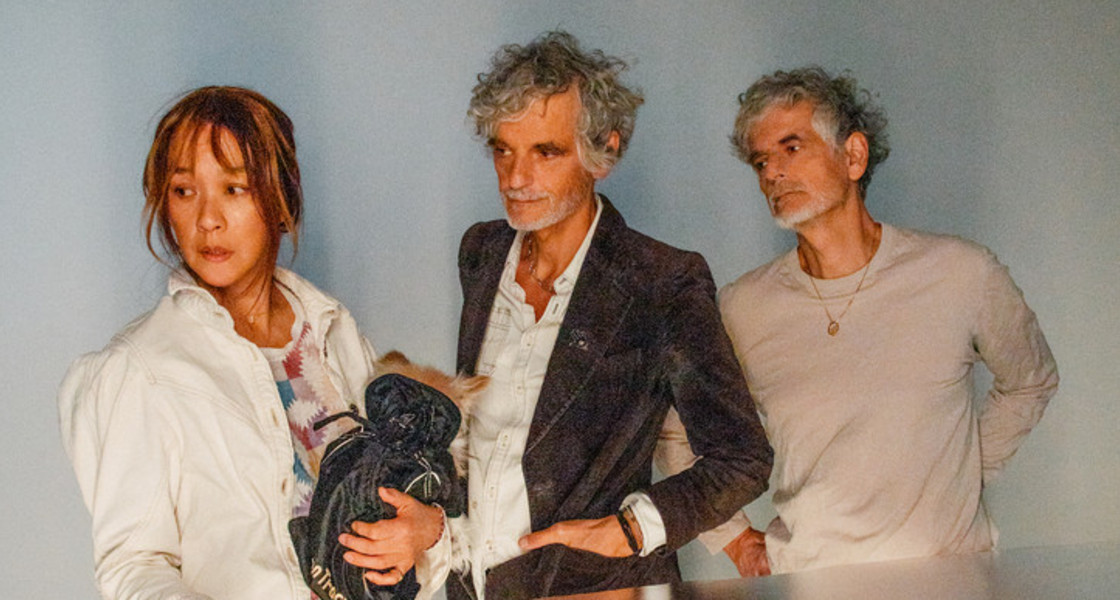
Kazu Makino– It's been a hectic morning.
office– Yeah, what's been going on?
KM– Well, just a lot of things that need to get done. Also, my dog has an upset stomach. She's 18 years old and quite picky with her food. I’m trying to give her what she wants to eat rather than what she should be eating.
I have two older dogs. If you take their dry kibble and mix in like peas and carrots and a little bit of chicken, they really like it. But they're not 18. That's crazy. Your dog is almost as old as me.
KM– That's… wow. She is me. She's really unbelievable, but still quite opinionated and stubborn. You know this, it’s not the spirit that dies down, it’s the body. Your spirit doesn’t get old, she’s my living proof of that.
Anyways, pet care aside. how did you guys all meet?
KM– People knew me as a musician so they brought me over from Japan. They were putting me through this testing period, letting me play and do my thing. But people knew me, and I had plenty of gig offers. So I was trying to find a band, instead of just always playing with different people. A mutual friend told me that he knew the right people, so I met Amedeo and Simone and that’s how we started.
Initially, it was just me and Amedeo playing together but really quickly we started playing shows and that’s when Simone joined. It’s funny. Amedeo was like, “I know this really good drummer, it just happens to be my brother. Do you want to give it a go?” And I’d never met twins before, so I smelled trouble. It was too unknown, and it felt like a bad idea, so I resisted for a while. But we started playing live shows immediately. We didn’t even have a name, it was a problem– we’d have a show but wouldn’t know how to advertise. So we just had to come up with a name. And I remember I was in a taxi and said, “What do American people like?” Because nobody knew us, and we just wanted people to come. I was like, “They like blonde people or red-haired people.” It was funny, because all of us have dark hair. I never thought it would last this long [laughs]
They do love their blondes. Amedeo and Simone, how did you feel when you first met Kazu?
KM– Was I difficult? [laughs]
Simone Pace– It was such a long time ago, but it felt great. Ame came home and was just like, “I just played guitar with this girl, she has such a great voice” and blah, blah, blah, and I was like, “Wow, that’s excellent.” Didn’t you guys play shows before I was in the band?
Amedeo Pace– Yeah, we played a bit. She and I met, and Kazu started to play often at the Knitting Factory.
KM– I remember playing weird shows around here. But we were just doing random things. I wasn’t even singing, I was reading! [laughs] I don’t know what I was thinking. But we tried everything.
SP– But it was interesting. There were some strange things Kazu would do [laughs]–like, the only time she would smoke cigarettes would be in this tiny rehearsal space that we had, which was about four square feet.
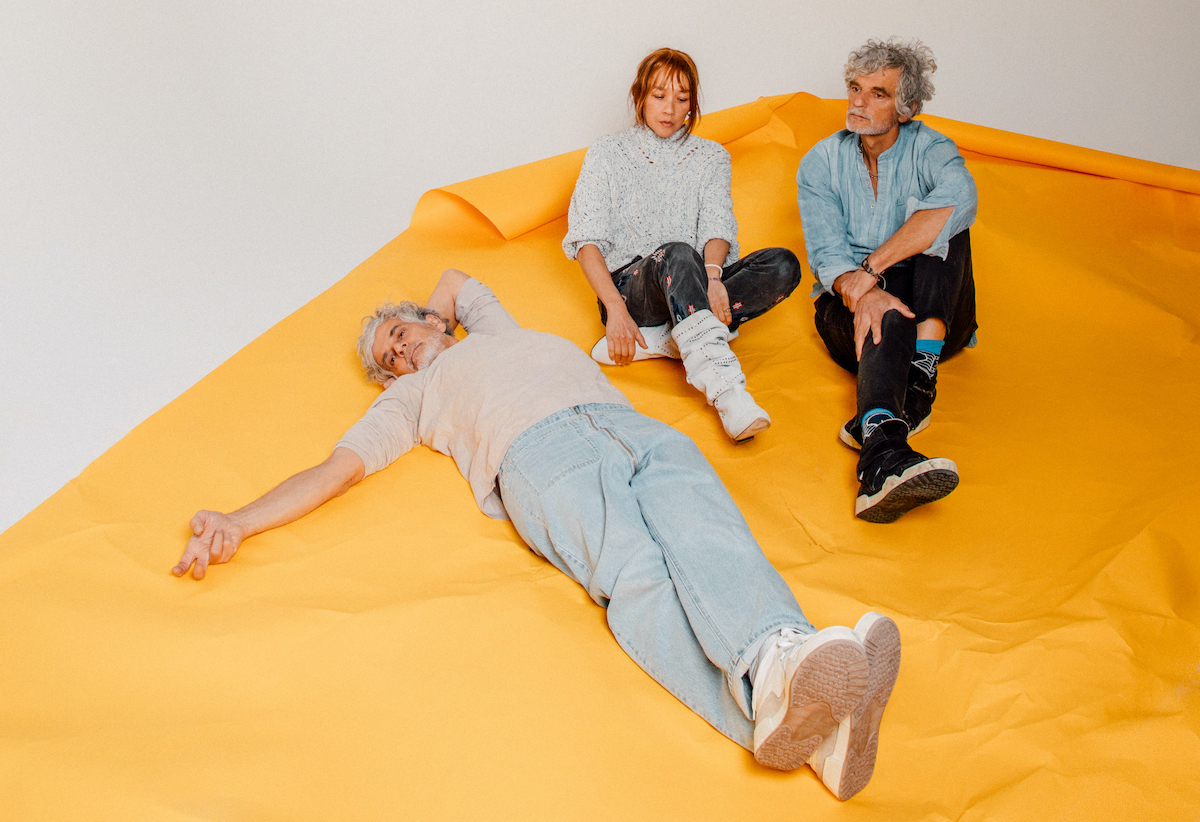
What's it been like staying together for three decades now?
KM– It doesn't even really feel that long. It was always hard, but I don't feel the weight of time as much. It doesn't really weigh me down. I wish time went by a little slower, but goes by super fucking fast.
So you have really no frame of reference. You don't know what it's like to be in something for three decades, because this is all it's been.
KM– Exactly. I have nothing to compare to. I never had a job and it never bothered me that I didn't have certain things. I didn't go into music to thrive, or get ahead in my career. I was never climbing any ladder– it didn’t feel like that. Music was an escape, you know?
I mean, you guys sort of ended up on top of the ladder, whether you expected to or not.
KM– Yeah, just like a tiny ladder. Maybe not even the two steps on the ladder [laughs].
So talk to me about this new project, “Sit Down For Dinner.” Where does the name come from?
KM– It comes from this one song we have on the album. It’s such a pain in the ass to come up with an album title. Your music– it’s not the kind of thing you want to put a name to, because it feels too final. You want to just keep evolving, you never want to say anything’s finished, because it could always be better. But at a certain point, you have to put it down, you have to give it a name. It’s not something that I feel is very rewarding, because it’s the part that’s like, “Oh, we have to stop now.” But the name is the name. “Sit Down For Dinner.”
I read somewhere that you got the title from this one passage of Joan Didion’s work on grief, where she was talking about watching her husband die at the dinner table. Is that true?
KM– Yes. Yes. Yes.
So what about the album made you want to reference Joan Didion seeing her husband croak while eating?
KM– That was the book I picked up when we were writing the songs– total freak accident. It was The Year of Magical Thinking, and I thought it was going to totally enhance me, but it was the most miserable book I ever picked up, and I had no idea. That's what her genius is– she uses the worst moment of her life to give her positive thinking. That’s also where the title comes from. “Sit Down For Dinner” is a super positive song, it’s very groovy, it’s light, and it moves. It’s a vibrant song, but the lyrics are insanely dark. I’ve never done that before, but I’m really pleased with it.
It made me think about the pandemic, when a lot of people couldn’t come home to eat with their families. I can’t remember the last time I sat down for dinner with my parents. And you, Amedeo, and Simone are all spread out, but this album is your first time coming together in 10 years. It’s that feeling of coming home, of being able to sit around the same table. It’s quite sweet.
KM– I like that a lot. I shouldn't be talking about what it means to me, because I don't want to influence people too much. That’s what’s so great about the album– people can just anticipate and read into it.
So again, it’s been ten years since your last album. In your creation process, has anything changed since that last project?
AP– We've been getting more familiar with recording and doing things on our own, which was difficult when we started making music. So with the pandemic, we were actually able to continue working remotely, sending stuff to each other.
Anything new you’ve tried out?
AP– No new tricks or techniques– we’re mostly just trying to figure out how to capture something in the music. Since the beginning, we’ve always tried to figure out a way of making interesting music, and that’s been ongoing for us. Seeing what feels good for the song– that’s what we’re constantly battling with, what feels good, what feels timeless, and what feels natural.
KM– For me, it's more about capturing what I feel right now. I think that's why I don't have a sense of time, because I'm just thinking about what’s happening now. How can I bring out what’s inside right now, today? That’s how I kind of move, you know? For this album, I was thinking, “I’m not gonna suffer for this one. I want to have a good time, I want to stick it out, and I want to execute everything the way I want.” I don’t want my ideas to be pushed over, washed over, you know? It’s something that happens quite often. When I send a demo and I’m told, “It’s not good enough, the vocals aren’t good enough, it’s poor quality, you need to redo it.” I’ve done things in tears because I didn’t think I could deliver, or because I didn’t want to do what they were asking.
But for this one, all that mattered was that I was happy. I wanted the same for Amedeo. I wanted to encourage him to go through with what he wanted to express. And it was quite amazing, and I left him alone. And one day, I was mixing with Simone and I was like, “Did he just say ‘snowman?’” I was really blown away that he could say that, and put that word into the song. I was totally amazed. And with Simone’s mixing, he really takes his time. It’s so fresh that, even after ten albums, he’d still take his time. It’s so brilliant. I’m glad you guys are having fun with it. I think after 30 years, you’re allowed to do whatever you want with an album. You get to say, “I’m making this album for myself and not for anyone else.”
And it’s cool that you have maintained the sound that made a lot of people fall in love with you in the first place– that very, sparkly, shoegazey, twinkly, almost far away type of sound.
KM– That's great. “Far away.” That quality you’re talking about– we want that. We say, “We want it windy,” like we’re playing outdoors and the drums are getting washed away. I really love that.
What’s the meaning of “Before?” I know it’s sort of about a kid who kind of knows everything, but I also get the vibe there’s hints of reincarnation.
KM– Yeah it's true. Some kids are just like that, just so knowing and so wise. Sometimes you just look a kid in the eyes and you think, “What do you know?” I wanted to have the chorus be sung by a bunch of kids going really crazy, but I couldn’t organize that because of the pandemic. But the song became kind of a writing exercise for me. I wanted to put the word “before” in the song as many times as possible. I kind of get stuck like that, with my own games that I make up.
When you're writing lyrics, is it an individual project or is it something you all collaborate on?
KM– It’s only me, and that’s ok because who wants to waste time, watching me write lyrics? There’s a lot of things I do at home, even melodies. I think you need to feel really, quite alone to put in real work. “Melody Experiment” was a good example, because we had that song laying around for a long time and we couldn’t wait. I just had this enlightenment, where I realized, “Oh, I know how I want to sing.” And Amedeo and Simone were like, “Yeah, let’s do it now!” So I started writing it down but I was laughing and cursing at them. I think the same thing happened with “Golden Light.” I wrote that in front of them and they were like, “C’mon, do it!–” it was like sports. But even they got tired and left, but I worked all night to perfect it. We had another song where I had to write outside the studio, sitting on the stairs.
AP– For that song, the melody was all done. I just had a hard time figuring, I mean, I had written lyrics but I didn't really like what I wrote, and Kazu has this really good way of writing. It’s a bigger struggle for me than it is for her, she’s very natural with it. And it takes me a really long time to figure out what I want to say and how to say it– how to convey my feelings into music, into words.
KM– But when he does it's really good. So I'm not complaining,
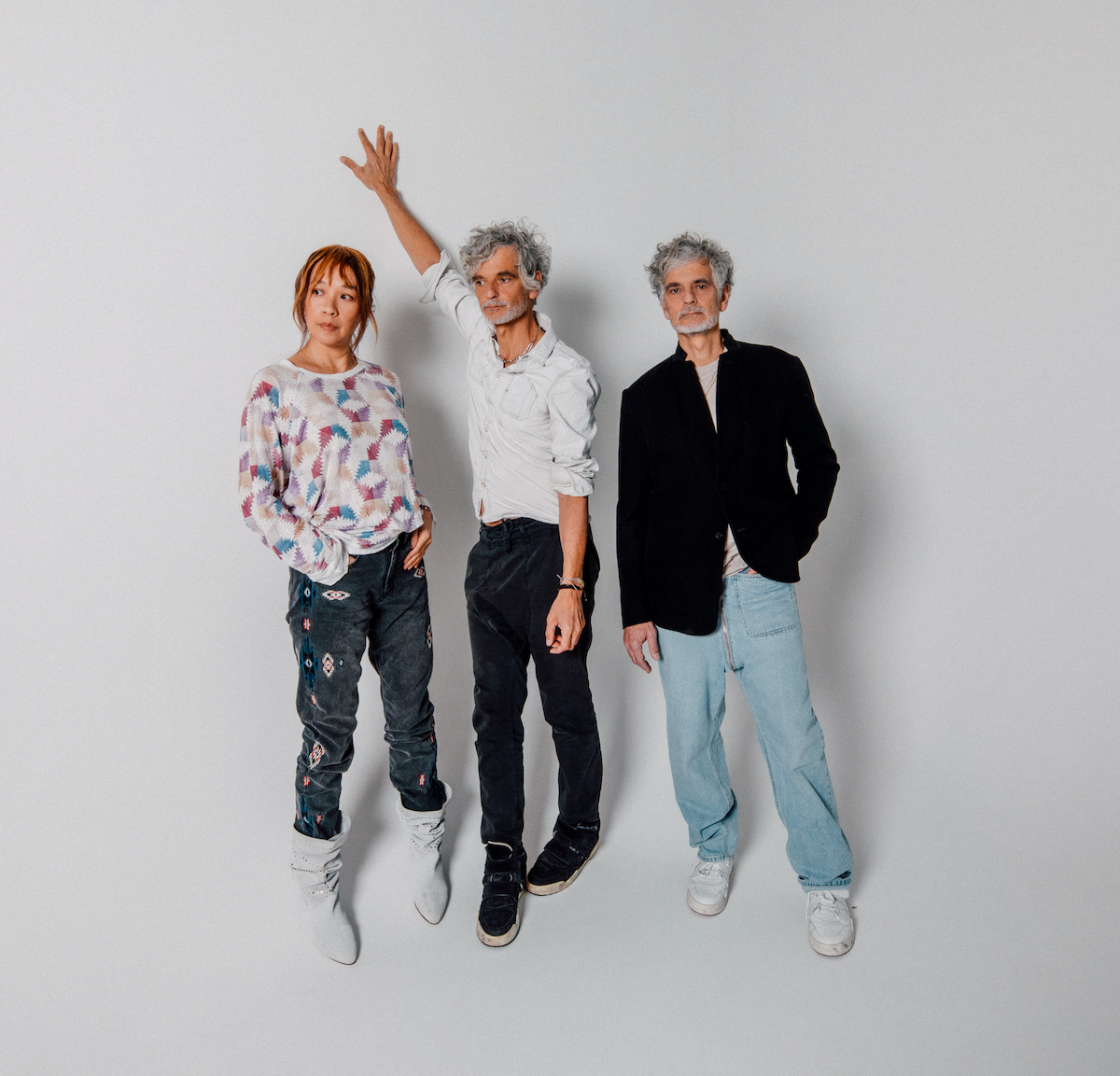
Last question– you guys started out in New York in the 90s. What do you think is different about the music scene today? Is there anything the same?
KM– We were never part of the scene, you know? We weren’t cool enough [laughs], I think we were quite isolated. We didn’t settle, but whenever we’d find a community, it would be outside New York. We were often in Olympia, Washington and made some records. But New York was necessary, because none of us are American, and we couldn’t really survive anywhere else but New York– culturally. But musically, people who supported us were never from New York. I mean, the studio we were working with gave us this really magic moment. But part of me didn’t want to become famous.
You know how New York is quite about money and fame and power. At all levels, some people were shameless name-droppers– I didn’t want to do that. I had this chip on my shoulder, and I wanted to make a name for myself. I didn’t want to become famous because of who I knew. I made a point of not being part of something bigger than us. At the beginning, a lot of people were like, “Oh, these are babies, these are kids.” And I kind of ran away from them. We were so different from them, because their background was really, really American– it’s culturally different. It would mean the death of us to try to copy that.
That’s definitely something we don’t hear about– non-American musicians in New York. Unfortunately, I think there’s a reason and it’s because a lot of what was happening in New York in the 90s wasn’t exactly conducive for people who weren’t already woven into that scene, which sucks. But I’m glad you guys were able to make your way through without it. Because it sounds like it’s the same today– when I hear people talk about New York in the 90s, for as much praise as they have for it, they talk about how exhausting it was, in the same way it is now. It’s name-droppy, it’s cliquey, it’s social-climby.
AP– I don't know about Simone, but for me, when we moved, we were struggling to find places to practice. But we had some pretty great places that came by, just because of the way New York was. You'd find this guy who talked to this guy who'd say, "Oh, I have a space down on Prince Street and you guys can practice there." We had a lot of friends, even if we weren't really going to shows. We did see some really important shows, like My Bloody Valentine and Pavement. At the time, those were very eye-opening to us in a way of how to make music. But it was more the magic of New York and how things were working. You could go out one night and all this stuff could happen, which was very unexpected and very beautiful in a way.
SP– When we came, we were taking a lot more chances than now, in the sense that we really embraced the city so much more than we do at the moment. We were just really hungry to get something done. And the fact that we met each other was really lucky. But I had every single job you could think of and that was all to support the band. I kept thinking, “I’m gonna do this, I don’t have to think of this as a job because my job is going to be the band.” So in my mind, everything that was happening was toward strengthening the band, and New York offered so many opportunities to be able to get there.
I’m really grateful that we were there because, it was this mix of love and hate, because I’d be so exhausted, but at the end of the day, there were so many things that had me thinking, “Wow, this is incredible.” So we really embraced the city. It wasn’t easy. At the beginning, we were just playing on the street, just to make money to pay rent. The rent was really low still, but we had to pay it [laughs]. But we paid our dues, and for that moment, the city was great. It’s different, but I’m sure there are people like us who are doing what we were doing at the time.
KM– A month ago, we went to this burger place where the chef used to be in a punk rock band that we’d tour with– so we’d get a little bit of a loyalty treatment [laughs]. We were in a booth and looking around, laughing because it was as if time hadn’t passed. It was exactly the same type of people we grew up with, but it was as if they stayed the same age. It’s the next generation, but nothing’s changed. We felt like we knew them all.
SP– There’s a few places in New York that still attract that old-school type of crowd. But a lot has changed too.

KM– I've never seen a city change so quickly. New York is NYU right now, it’s being taken over. It’s a complete invasion. It’s crazy, I mean, I didn’t know any student except you now, but they come out of nowhere. But you’re almost done [laughs]
Yeah, it’s gonna suck not getting that student discount, but I do hate how the school treats the city.
KM– I'm not complaining about NYU [laughs]
You can. I won’t blame you and I won’t disagree.
KM– With so many people studying, so much of the population is transient. They’re not gonna stick around, and they know that. It almost feels as if you’re an islander and you have these waves of tourists who are jacking up prices. Rent has become so high, but so many apartments come and go.
It’s weird when people talk about New York as a pit stop. They’re like, “I’m gonna finish high school and then I’m gonna go to college and I’m gonna go crazy because it’s New York and then I’m gonna leave.” It’s a big four-year playground, but it’s too expensive to spend four meaningless years here. If you’re looking for personal development, you can really do that anywhere where it’s not as expensive to live. Maybe that’s just me being a hater, but it makes it really hard for the artists who come here with no money, who start from zero, and who still manage to eat and survive and create. For me, I don’t know where else I could go. My job is here, my career is here, this is a good spot for what I want to do with my life. I’m not really seeing this as a stepping stone.
KM– Exactly, because where else could you go? That’s what I was thinking, because if you step outside of New York, America is bleak. California is maybe cool, but I’m still weirded out by how nice everybody is.
AP– I’m in Greenpoint, and when I moved here, it was really nice– quiet. But now, there’s so much construction that it’s overwhelming, and I’m really feeling it. There’s constant noise, and maybe I hear a bird once in a while but there’s constant noise. And I can smell the air. When I go away upstate, it smells so good or doesn’t smell like anything at all, but in the city, there’s a smell to the air.
A nice, heavy stench.
AP– I think, after so many years of being here, I need something different.
KM– You've been saying that for a long time.
AP– Yeah.
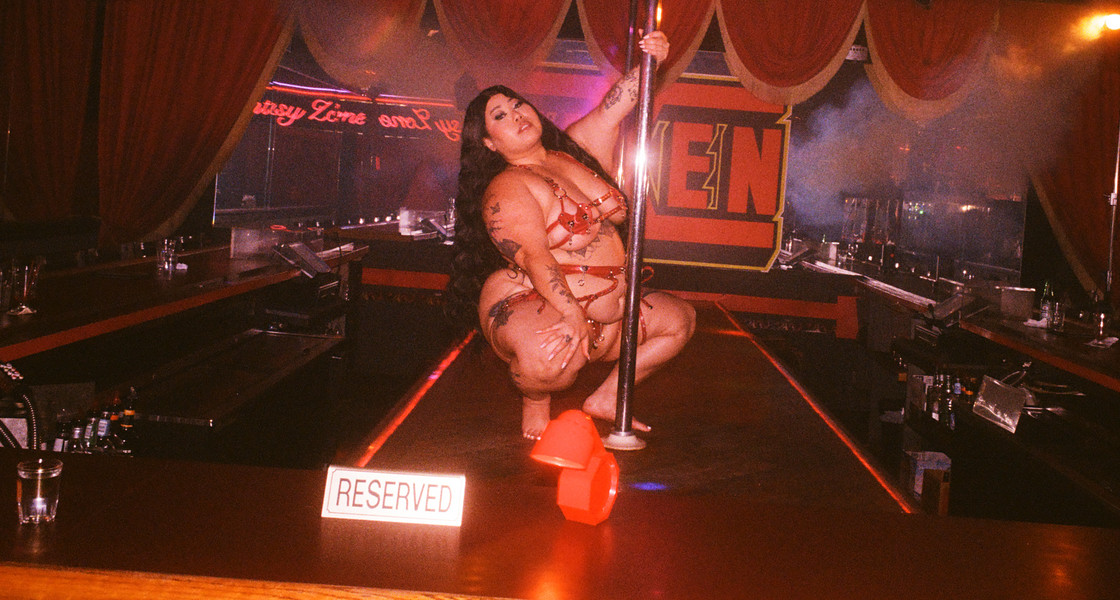
Easter eggs are rampant in the Kaguya timeline — from classical training in the piano and flute (“superior excellent” ratings at state competitions) to a previous life as a photographer. What’s clear is that these colorful life experiences, while varied, have served as a unified force for creative excellence.
During our chat, she greets each question with a quick pause and eloquent reflections. Kaguya’s energy feels grounded in longtime familiarity with the worlds she travels in. She has spent years advocating for self-love, body acceptance, and her well-earned place in the realms of culture, fashion, and music as a plus-sized Asian creative. "2AM" is new, fresh, and sultry, but the world-building vision behind it is years in the making.
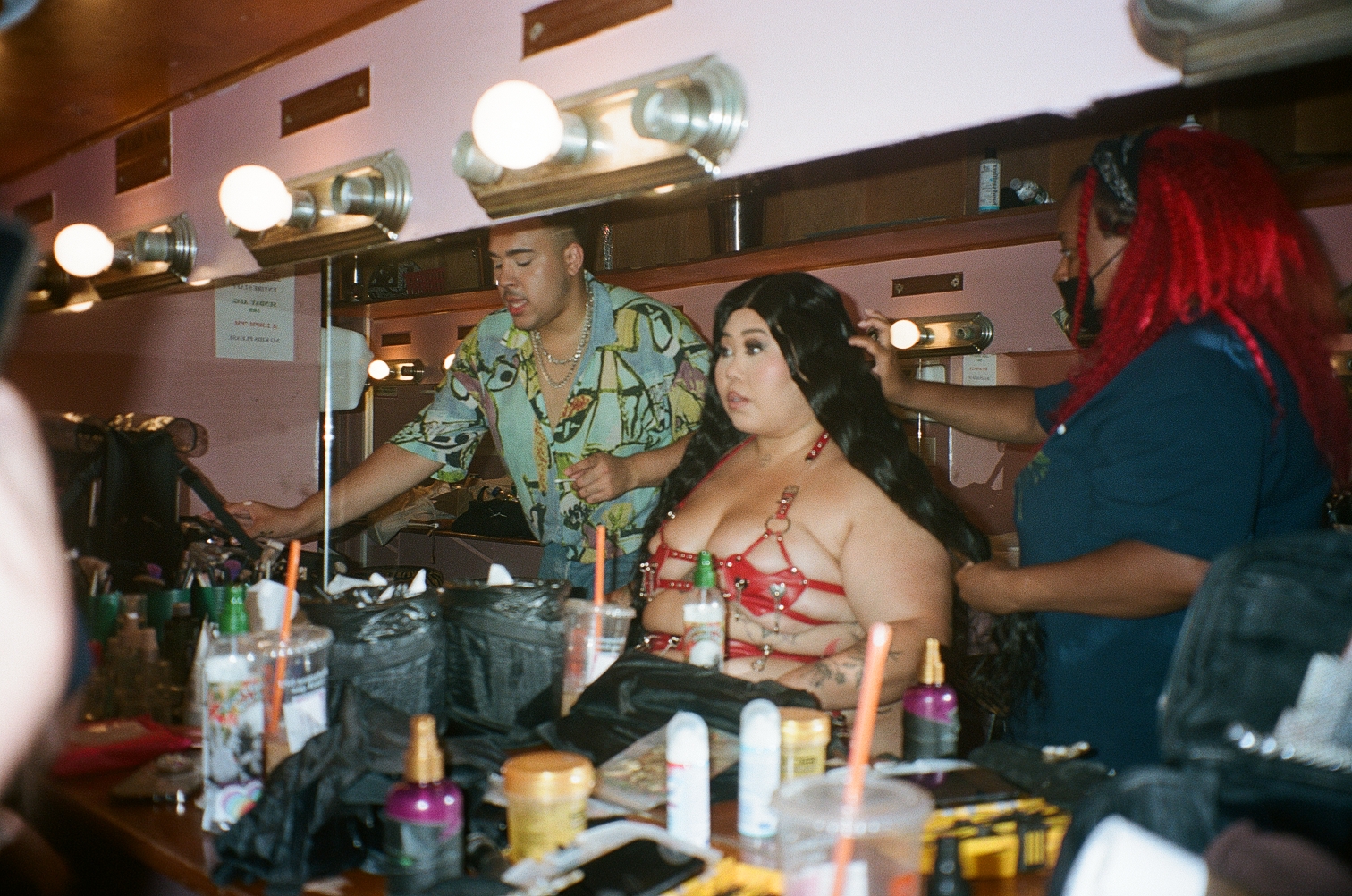
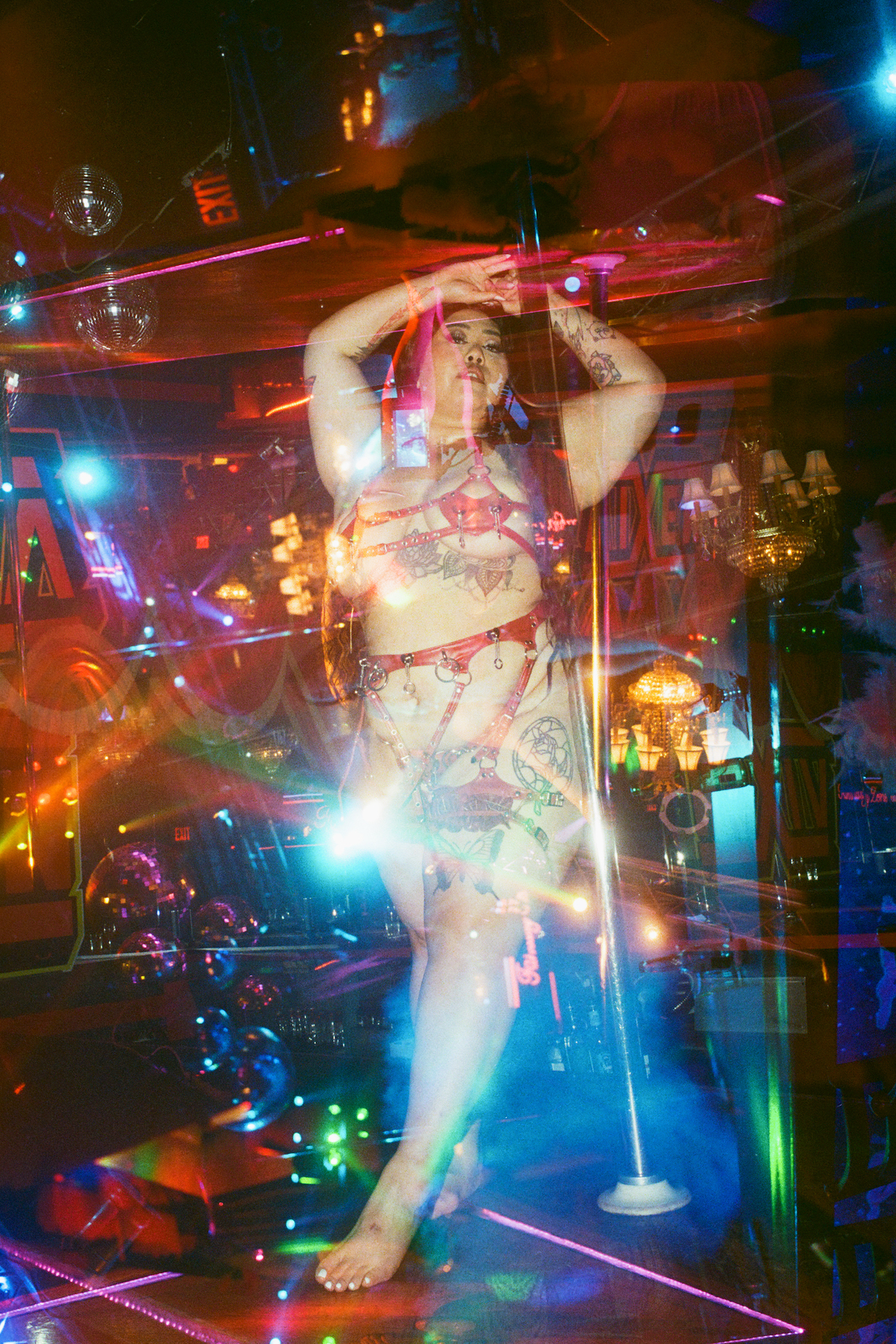
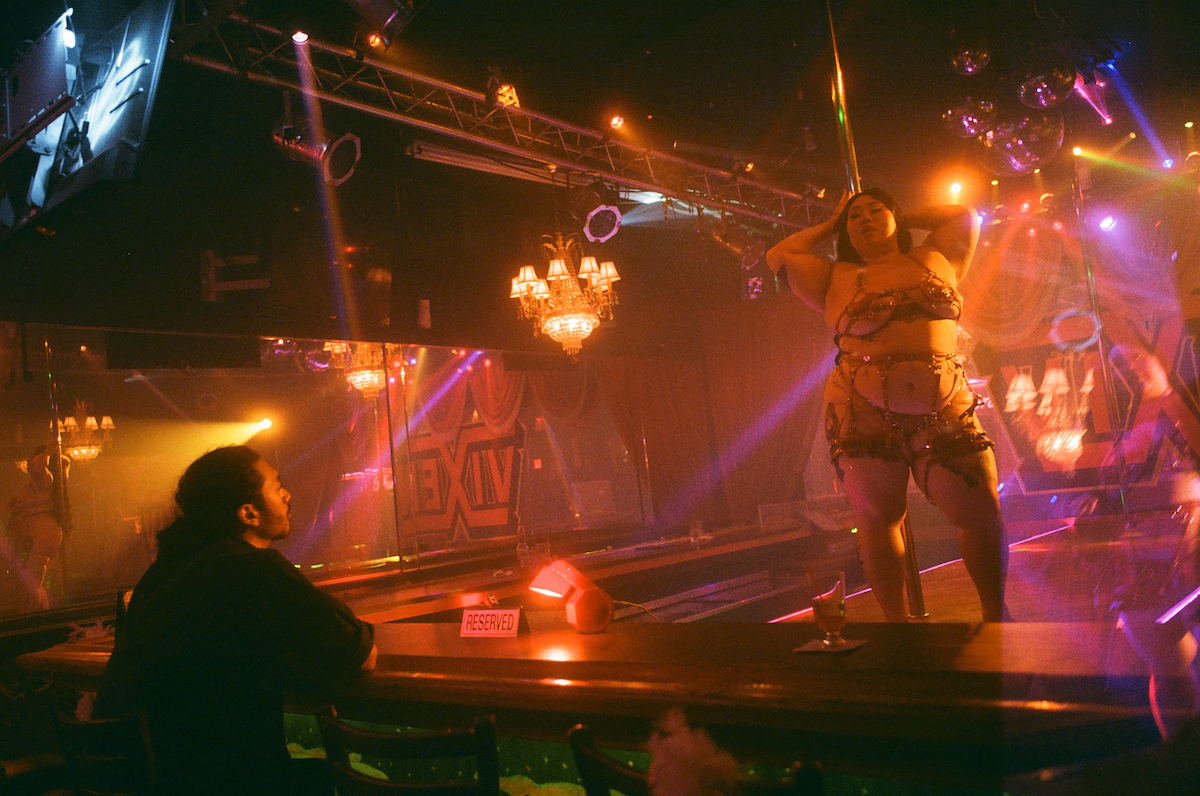
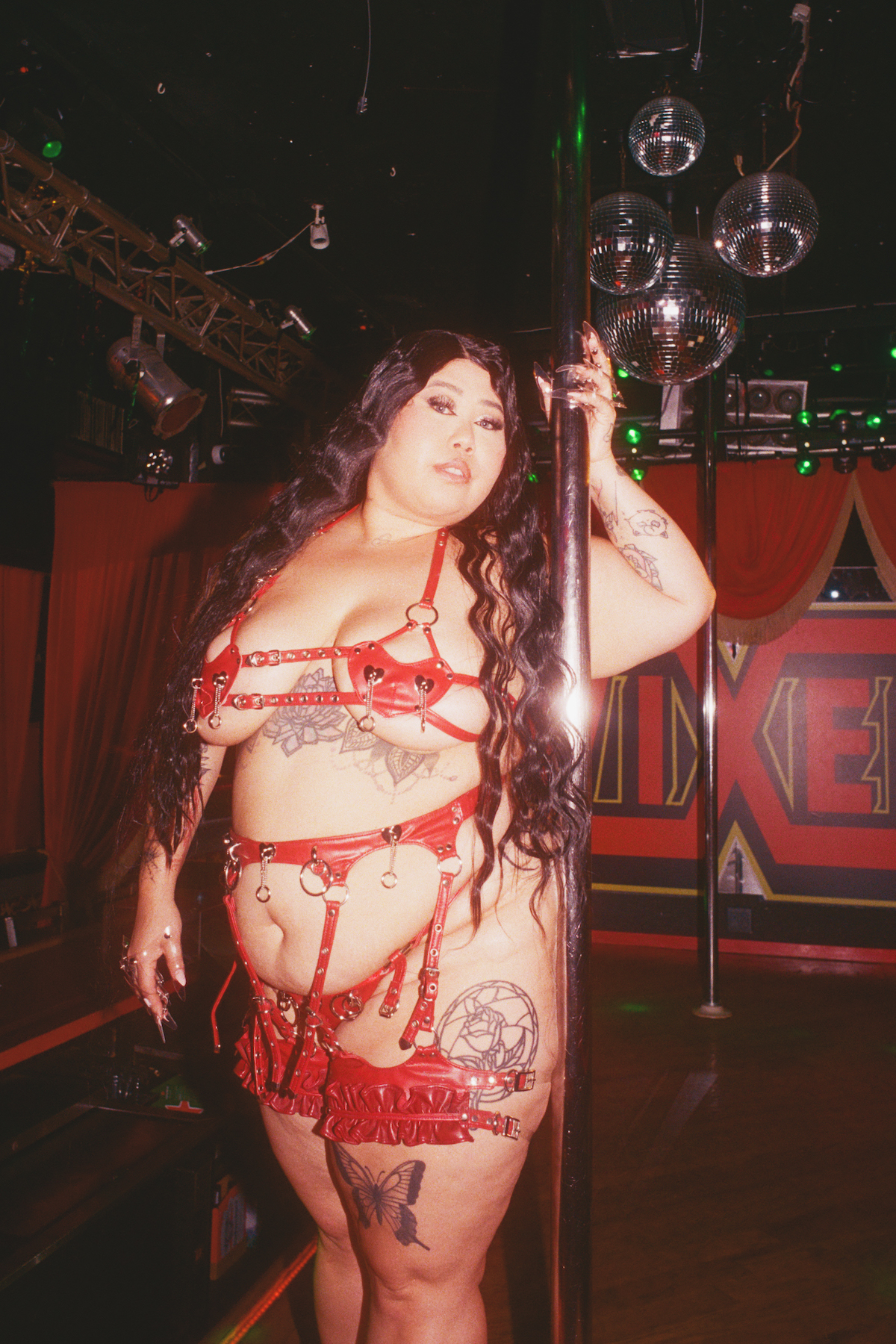
How are you doing? How are you feeling post-launch?
I'm super relieved that the music video has launched, but unfortunately the Instagram algorithm hates me… They marked my music video as adult content! I mean, that's honestly something I've been dealing with as a plus-sized Asian person. So, I’m just like, it’s okay. It’s reaching the people who will ultimately listen. Especially once I launch the rest of the things I’m working on, it should be fine!
What was the world-building process like for "2AM" and its video?
Most of my lyrics are “sad girl” music. The first single I produced was more of the energy of Sade, R&B, etcetera. For the second single, I wanted it to be reminiscent of a Slayyyter, Charli XCX, bubblegum pop, early 2000s nostalgia vibe.
I’ve had an art studio for almost two years — Rice Studios. I also have a lot of friends in New York that I met while living there. Some of the video was done in Rice Studios with an Uzumaki Gallery installation — she’s a friend of mine and was in New York, so I said let’s collab! For the armor and costuming, I reached out to a designer friend Sho Konishi, and they ended up styling the whole video too.
The concept for the video shoot was inspired by my love of manga. I have this favorite manga series called Chobits, and the whole series is basically set in a version of neo-Tokyo. Everyone has an AI bot that looks like a real human, but they lack love. There’s this one special bot, and her whole thing is, “I'm looking for the person just for me.” The character is based on that, and on me not seeing much Asian, plus-sized representation in the music industry.
The song seems to be telling a narrative of unrequited love. It’s late, the character hasn’t heard back from her lover… is that based on you?
Yes! I would say that. I was single for a long time, and the message is basically like, bitch why aren't you calling me back? Like, I’m tired of your narcissism [laughs].
What was it like learning how to build an identity online?
I went to school for photography at SVA. At that time, being a renaissance person was frowned upon, so I cut off some of my hobbies and fully dove into photography. That was a fun run. In 2017, I decided to go public with my self-love journey and started taking and posting self-portraits. Ryan McGinley reached out to work with me, I was featured in the Vogue100… I still wasn’t signed as a model at the time. Everyone was like, how would we sign this Asian BBW - she’s tatted, she’s short, she’s older, we wouldn’t know what to do with her. In 2019, I did get signed and I’m super thankful for the whole journey. Now I’ve worked with Nike, Google, Apple, Instagram, Sephora… you name it.
What are some personal or professional goals you've set for yourself in the next few years?
I just signed with a new agency — The Alternatives Management. I'm excited for what modeling can bring, and I have a new project coming up I can’t reveal yet, but it’s exciting.
Honestly, I see myself moreso becoming an agent after a certain time because I'm 34 now. As much evolution as casting can do with inclusivity and range, I still know my circumstances within the industry. They're always looking for the next young, fresh meat. But it’s not stopping me, regardless.
I'm also working on my next album — I have a whole set list and I’ve been chatting around with different producers and people I’ve met in LA. It's going to be more like an Avril Levigne, angsty, pop punk vibe.
I would describe you as a meme lord of the highest order, how did that become so central to your online community-building?
When Instagram started shadowbanning me, literally for my physicality, I thought to myself: well clearly, I can’t just post myself anymore.That’s when the shift happened.
I love memes — in interviews I’ve been asked about inspirations and I always respond, “Memes!”
At the same time, I was born in the age of tragi-comedy, so I always think there should be lightheartedness. It’s a way for me to translate how I feel, and to communicate my experiences. There’s still a curation to it, even if it's of the delusional state of today.
Beyond your music, meme-crafting, and modeling, what should people know about you?
Within the last year, I began working on a digitized platform for Rice Studios, essentially a new social network that folds Web2 — artists and their merchandise — into a Web3 world. I’m going heavy into crypto spaces, becoming a techie and doing my due diligence. I’m doing this to decentralize the industry standard for musicians’ fees, which always needs more exposure.
The studio is for POC queers, which is where the inclusion of “rice” comes in, because that’s often where we feel at home. We’re launching a music space where artists can have their own platform, instead of jumping onto other streamers with a more equitable payment plan and different, more personable interactions with fans.
I also made a cyberspace and virtual reality experience within the project to host the viewing party for "2AM". There’s a virtual showroom with a whole art wall of BTS, 35mm film outtakes, and screens to view the video.
What advice do you have for young artists who are trying to find their unique voice and navigate the complexities of self-expression in today's digital age?
Be true to yourself. Do what you want to do! If you don't see something happening in the industry, be the first to do it. There’s no use in waiting around for someone to offer you an opportunity when they have no idea who you are. You know? Grab the world by its balls.
At the end of the day — and I’m not bragging about it — but I know I’m one of the first people who looks like me, who’s queer, to do this and over time I’ve learned how to speak my truth because this is my journey.
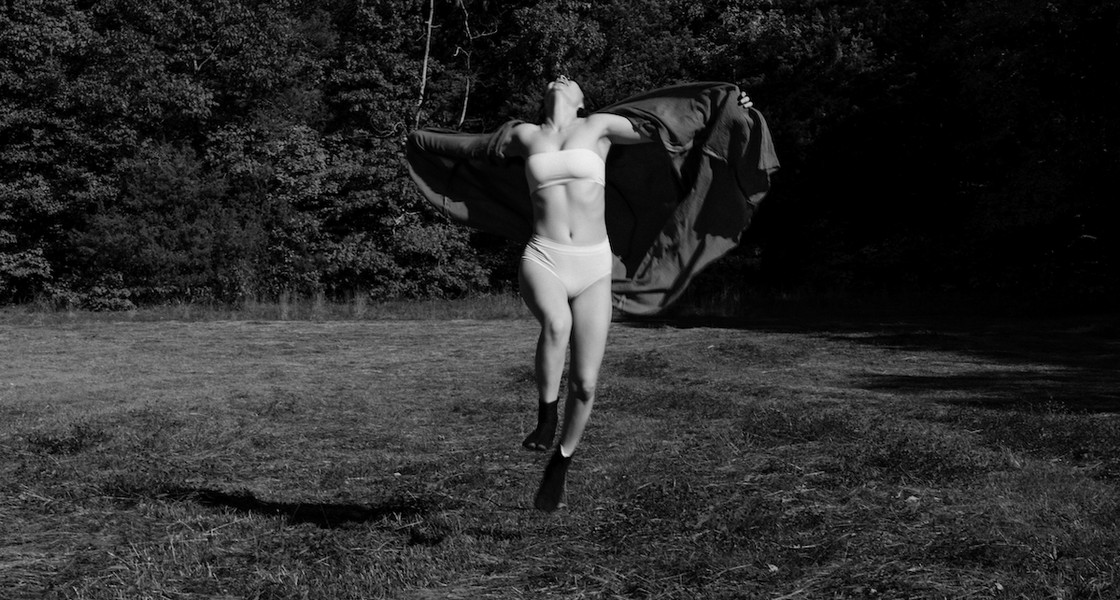
Last week, which happened to be the day before her birthday, Mitski hosted an intimate show at Town Hall as part of her “Amateur Mistake” tour. It was a stripped-down, full-length performance of her album, featuring only herself, an acoustic guitarist, and an upright bass. The audience exuded a quiet sense of reverence. Just before concluding the show with some of her earlier music, Mitski invited the previously silent crowd to sing along, proclaiming, “We can forgive each other that much.”
“Amateur Mistake” takes its name from lyrics in the first song on the album, referencing the all-too-familiar act of making promises that can't be kept and realizing that “when you break them, they break you right back.” However, Mitski has upheld her promises, both to herself and to her devoted fans. In a pre-show speech, she alludes to a fan favorite from her sophomore album, stating, “I was wondering whether I could keep dreaming for a little bit longer, or whether it was time for me to let go and be more realistic — let other, more ambitious, more talented people go that way and stay behind myself. But I couldn't let it go. And I was in New York while I was dreaming. God, I was so stubborn, and I just kept dreaming, and now it's been ten years, and, I guess technically, all my dreams came true… Thank you, New York, for growing up with me.”
In sound, writing, and performance, Mitski appears to have reached a pinnacle of maturity. Compared to her early work, she allows herself to be softer, letting shine the ferocity of the words themselves. Her vocal delivery is clear and gentle, almost a whisper at times, a stark contrast to her past songs like “Drunk Walk Home” and “Townie,” known for their fuzzy, passionate vocals. The warm country twang that infuses the instrumentals is unlike anything we've heard from her before, a welcomed surprise. Her writing becomes more self-reflective, as she sings of drinking, dying, and existential dread. If Mitski's previous albums symbolized her tumultuous adolescence and anxious twenties, The Land Is Inhospitable And So Are We represents a retirement, akin to rocking on a porch on a peaceful farm.
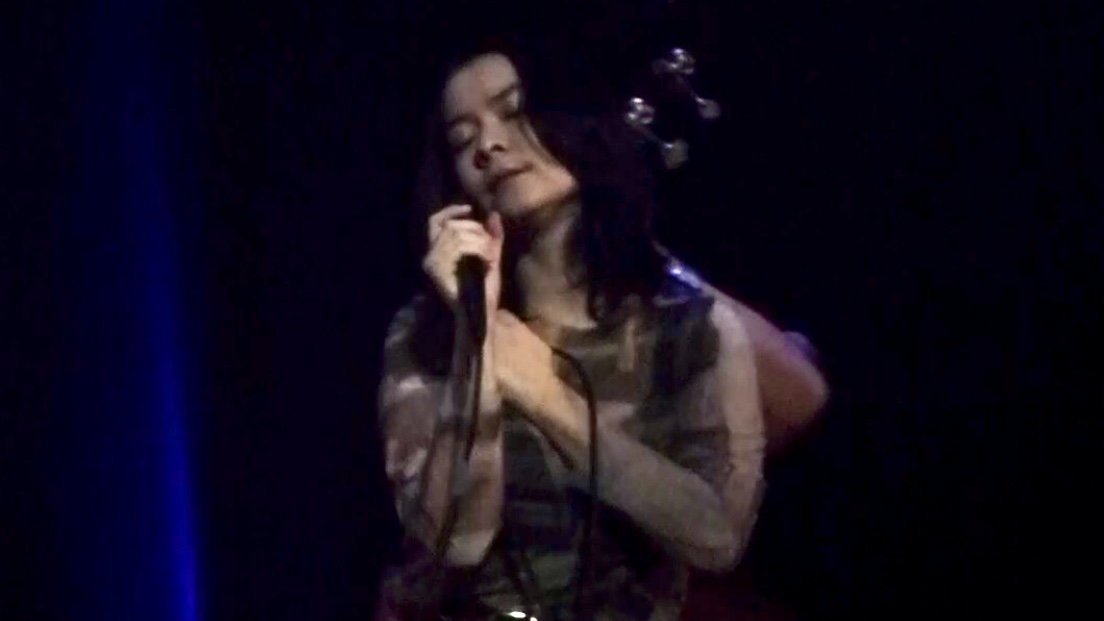
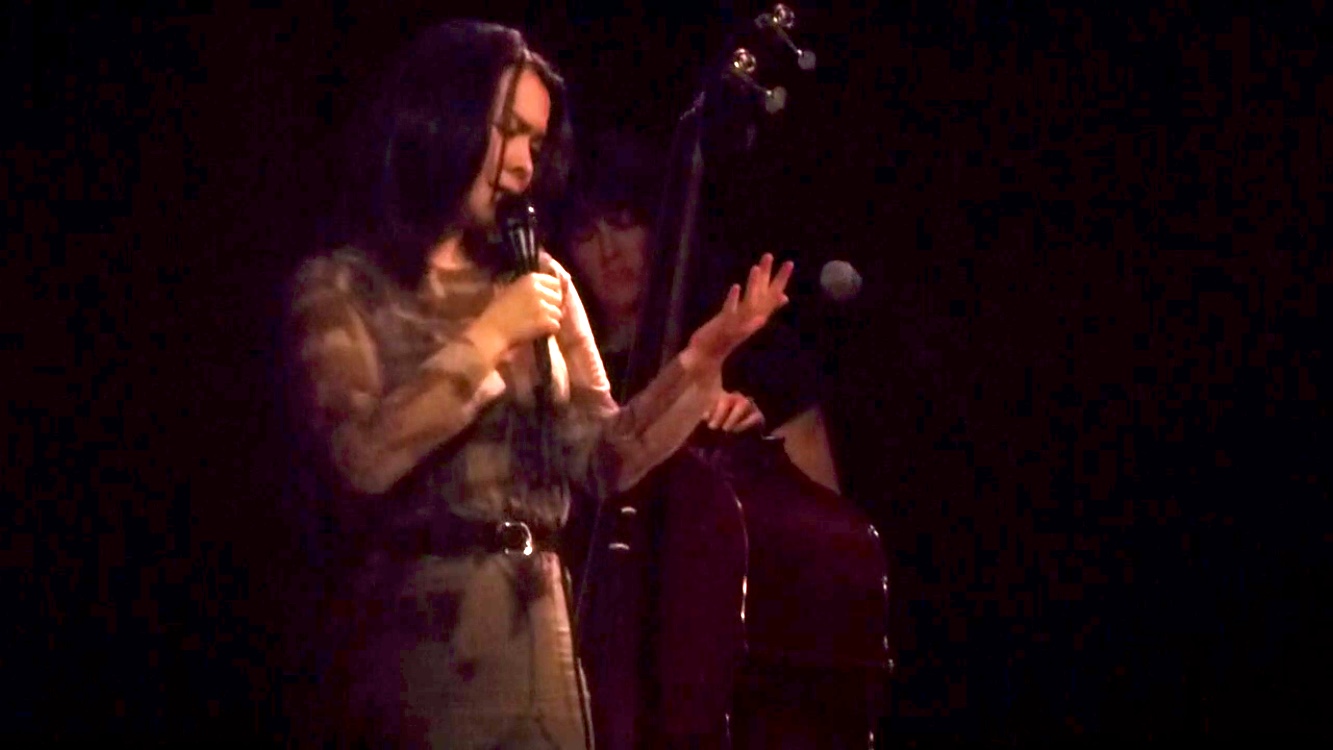
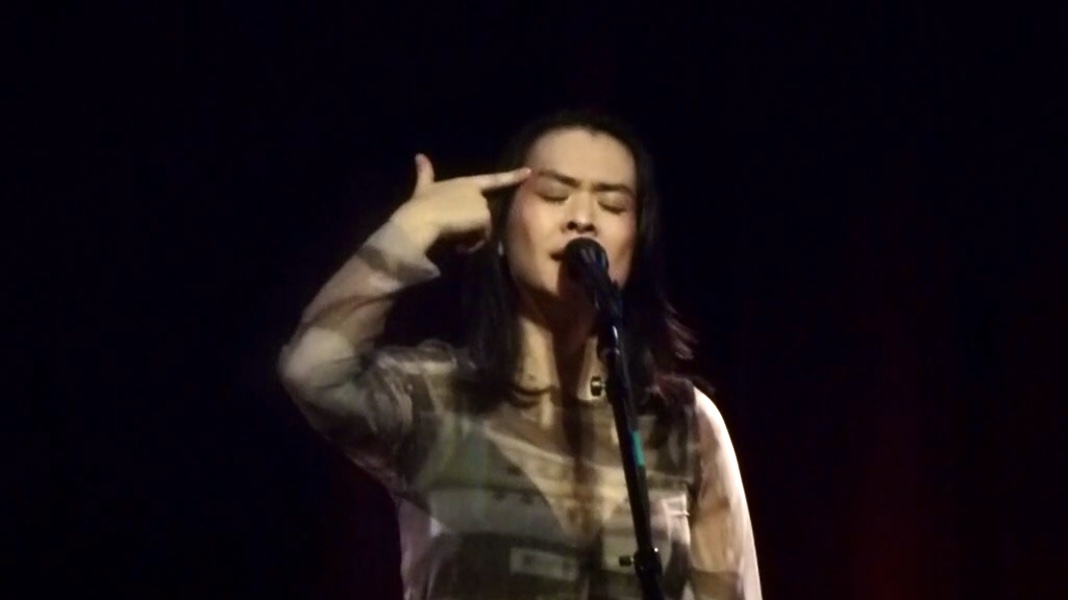
Although Mitski gained more popularity from her music starting in 2018, she's no musical novice. The first time I listened to Mitski, I’m 14 and in Ohio, watching an episode of Adventure Time. Someone sings something about not knowing where to put their hands – I start crying and don’t know why. I google the lyrics and find Mitski, I devour her entire discography on Youtube, and I watch the “Your Best American Girl” music video, crying even more, realizing that losing to a blonde girl and being left with your own hand was an all-too-common experience.
The first time I listened to The Land Is Inhospitable and So Are We, I’m 21 and in New York, walking myself home from the club. I’m stumbling and kicking cans down the street. I spent most of my teenage years alone listening to Mitski. The same can be said seven years later.
"I Don't Like My Mind" — it’s the fourth song on the album, but the title catches my eye, so it’s where I start. Mitski wails like the wind. It’s despondent. It’s hysterical. It’s too familiar. Mitski’s singing about eating a whole cake and throwing it up, and I’m going home to eat cold pasta and contemplate past loves. I fear that I'll forever be stranded on the West Side, no matter how far I walk.
"The Deal" —that midnight walk Mitski references is the one I’m taking right now. Perhaps this album is meant to be savored while walking home alone, yearning not to be the kind of person who always finds themselves walking home alone. The song and I both ache to share life with someone, even if it means sharing the consequences of our actions. Does the desire to share life also entail sacrificing freedom? Is loneliness the price of independence? Mitski's song builds to a crescendo that evokes memories of movie scenes where people run alongside departing trains, desperate to maintain eye contact with their departing lovers. Had I sprinted, I might have caught that bus.
“When Memories Snow" feels strangely triumphant, or perhaps its resilience masquerading as triumph. There might be a distinction, or maybe not. True triumph might be reserved for those whose lives don't demand resilience. The song has a touch of madness, and it yearns for a respite — I feel the same. It's a bit hysterical, just like me, typing frantically as I walk. Names and footprints carved in dried cement keep time with the sound of horns. I'm reminded of the time when I believed Laurel Hell would be Mitski's final album — and given how virality was reductive to both her and her music, I couldn't blame her.
"My Love Mine All Mine" — Heavy boots, a sad circus. I walk past a church here and a solemn understanding washes over me. Amidst the pit in the construction zone, I have an epiphany — the only thing truly mine is my capacity to love. It's a moment of sympathetic, bittersweet acceptance, wrapped in tenderness. There's a longing, but also a melancholic smile. The departure of someone I loved does not mean the departure of my ability to love. It's a hard realization to embrace.
"The Frost" —The first thing I notice is the slide guitar. The second thing is the smell of sewer water, and the discarded cigarette packs in the puddles. I recall my freshman year when I saved money by not buying cigarettes because I’d find packs on the ground. “You were my best friend; now I’ve no one to tell how I lost my best friend.” I know how to get home from here, but I wish I didn't have to make the trip alone. I remember walking my old best friend home in the rain on his last day in the country. We exchanged "I love yous." I miss him, I’ll love him forever, and his memory is all I have; these three statements can all be true at the same time.
"Star" — Here the mood turns optimistic. The crickets chirp loudly in the bushes, Spirit Halloween has made its annual return, and I’m fondly thinking of people. Even if the love isn’t present at this moment, its memory lingers the same way we gaze at light emitted by long-dead stars. Towards the end, the song feels like soaring through the sky.
"I’m Your Man" — Scrap everything I said about optimism. This song is like walking through a tempest. It's a numb, disbelieving and regretful sensation. It's apologetic — "You're a dog, and I'm your man; you believe in me like a god, and I destroy you like I am." Mitski's voice is heaven-sent, and if there's one thing she loves, it's dog motifs. There's something about animalistic ferocity as an expression of love. Those dogs in the background, were they the losing ones she bet on before?
"I Love Me After You" — A slow, steady, stone-faced march. The swaying of street lights, the wind at my back; the song can be interpreted in a few ways. "I love me after you", as in "I love myself secondary to you, I love myself in relation to you.. Or perhaps it’s, "I love myself after I've finished loving you," a statement of sequence rather than priority — once we're done loving, I return to myself, or even, "I love myself now that you are in the past." Mitski transitions from addressing the "king of all the land" to becoming him. This is the final song on the album. If this were the end of my walk, it would serve as a strong, solemn finale. But I'm still ten minutes away from home.
"Bug Like An Angel" — This song preceded everything else on the album. In my initial listen, I wonder if I drink for the same reason that Mitski suggests, because “a drink feels like family." The night it was released, I treated myself to a café,ordered a cocktail, noticed a bug on it, and bit into what I thought was ice, but turned out to be a massive shard of glass... It's poetic, this punishment for my indulgence— it's eerily fitting. Now, as I walk home, I pass by some kids checking in on each other, joking about how it's not normal to go out and drink every night. Tonight, I cashed in the few remaining favors I had because I couldn't afford a cocktail.
"Buffalo Replaced" — This is what Mitski meant when she described this as her most American music. It brings to mind the track from Laurel Hell, "Heat Lightning," in its dependable, rhythmic plodding. I'm nearly home, and it's an arduous walk, much like the slow stride of a large grazing animal. I pass by the KFC near my house in the same way a buffalo grazes a meadow.
"Heaven" — This marks the conclusion of the album, and I've arrived home. It's a country waltz, gentle, and devoid of demands. I feel like a genuine Southern belle, being escorted to my doorstep or greeted as I descend the stairs for prom night. It's akin to receiving a chaste, unexpectant peck on the cheek — sometimes I yearn for that to be all someone desires from me, and at other times, I wish I could be content with just that. "I bend like a willow thinking of you—" I'm about to eat some pasta and think about that line.